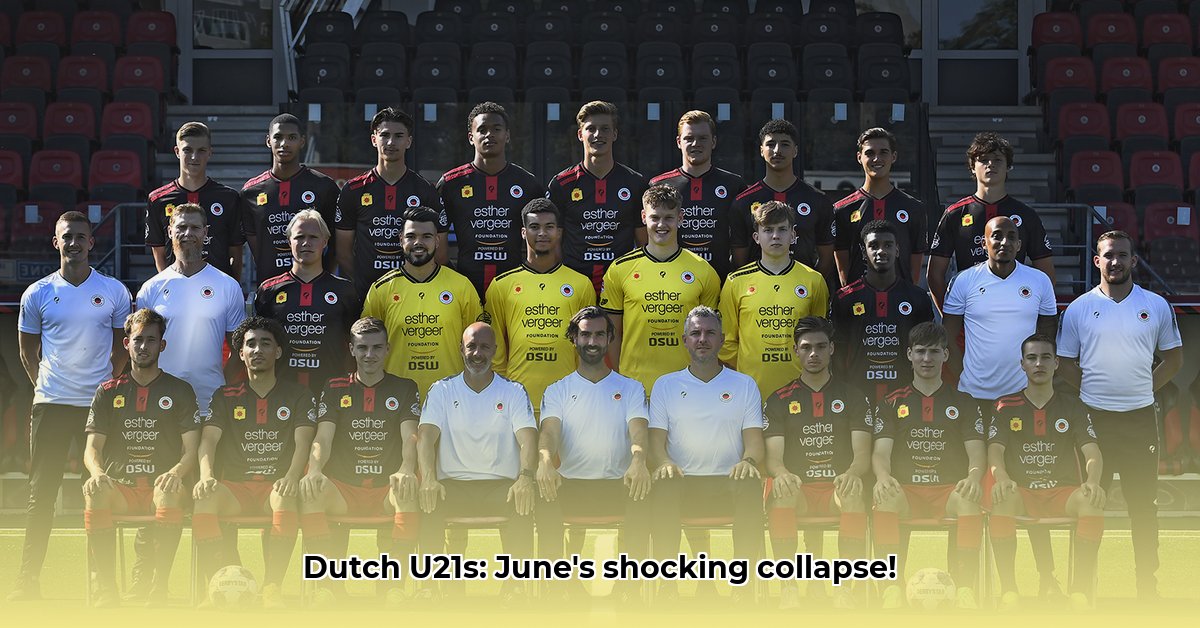
The Netherlands U21 team's June 2025 UEFA European Under-21 Championship campaign was a frustrating mix of brilliance and inconsistency. While showcasing moments of exceptional attacking flair, defensive vulnerabilities repeatedly undermined their progress, leading to a final record that fell short of expectations. This analysis delves into their performances, identifying tactical weaknesses and offering actionable recommendations for improvement.
June's Setbacks: A Match-by-Match Breakdown
The Dutch U21s' June performances were a rollercoaster. Victories against Portugal (1-0) and Ukraine (2-0) showcased their clinical finishing and intelligent movement, highlighting their potent attack. However, losses to England (1-2) and Denmark (1-2), alongside a draw with Finland (2-2), exposed serious defensive frailties. This inconsistency, reflected in their final record – one win, one draw, and two losses – needs urgent attention. The question isn't who is to blame, but what needs fixing.
Portugal (1-0 Win): Efficiency and Control
The victory over Portugal highlighted the team's ability to be clinical. They limited Portugal's chances and capitalised on their opportunities perfectly. However, this match also showcased an over-reliance on a narrow, possession-based strategy.
England (1-2 Loss): Defensive Fragility
The loss to England starkly revealed the Dutch U21s' defensive weaknesses. Individual errors at the back proved costly and England capitalized on opportunities created through counter-attacks and set pieces that exposed a lack of defensive cohesion and organization. Were the players lacking communication, or was the defensive strategy simply inadequate?
Finland (2-2 Draw): Midfield Control Issues
The draw against Finland underscored a lack of midfield control and dominance. The Dutch side struggled to dictate the tempo, leading to increased pressure and defensive errors. Was their possession-based game plan outmatched against a more combative opponent?
Denmark (1-2 Loss): Tactical Rigidness
This defeat exposed the team's inability to adapt to varying opponents. Denmark's aggressive pressing style disrupted the Dutch possession game and left them struggling to create chances, while their transitions to counter-attack were poorly defended.
Ukraine (2-0 Win): Attacking Prowess Again
The final win over Ukraine demonstrated their strength in attack. The team’s ability to strike efficiently when presented with opportunities shone through once more. This underscores the need to focus on strengthening the defensive side of the game without sacrificing the team's attacking prowess.
Decoding the Tactical Tangle: Root Causes of Inconsistency
The U21s' inconsistent performances stem from a combination of factors. Their reliance on a possession-based style, while effective when it works, proved vulnerable against teams adept at counter-attacking or disrupting their rhythm. A lack of tactical flexibility, demonstrated by their struggle to adapt their approach against differing opponents, further hampered their performance. This points to a more fundamental problem – a lack of versatility and adaptability.
The defence, especially, suffered. Communication breakdowns, positional errors, and a failure to adequately deal with quick transitions all contributed to defensive frailties and conceded goals. Were fitness levels an issue? Could this simply be a matter of better coaching instructions? The answers are critical to resolving the problem.
A Roadmap to Redemption: Actionable Recommendations
Addressing the U21 team's issues requires a multi-pronged approach, encompassing both short-term and long-term strategies. This isn’t about finding scapegoats but about building a team capable of consistently competing at the highest level.
Short-Term Goals (Within 1 Year):
- Enhanced Defensive Drills: Improve set-piece defending, communication between players, and tactical awareness and defensive positioning through intensive training. The focus should be on preventing fast attacks and building stronger defensive habits.
- Tactical Adaptability Training: Implement training sessions designed to improve adaptive strategies. The team will learn to adjust approach based on opponents' strengths and weaknesses, creating a more balanced and versatile playing style.
- Individual Player Development: Tailored training programmes for individual players to address specific weaknesses and shortcomings, focusing on developing defensive skills in players who need it most. This will require thorough analysis and focused coaching.
Long-Term Vision (3-5 Years):
- Invest in Youth Development: KNVB needs to invest heavily in youth development programs. This includes improved coaching education and a clear pathway for young talent to reach the highest level.
- Data-Driven Recruitment: Introduce advanced data analysis to identify players with the right attributes. This will aid in selecting future players with the required skills to bolster the team's defensive capabilities.
- Strategic Long-Term Planning: Develop a comprehensive long-term strategy for Dutch football across all youth levels, ensuring better coaching and player development. This will lay the foundation for a more successful future across all levels.
| Stakeholder | Short-Term Actions | Long-Term Vision |
|---|---|---|
| Coaching Staff | Implement improved defensive drills, tactical flexibility training, and individual skill development programmes. | Develop a comprehensive youth development system with advanced data analysis. |
| Players | Improve defensive positioning and communication; enhance physical conditioning. | Develop greater tactical awareness and adapt to different playing styles. |
| KNVB (Dutch FA) | Invest in better coaching education and advanced analytics. | Create a sustainable youth development pathway, ensuring better player acquisition. |
The Netherlands U21 team possesses undeniable potential. Addressing the identified weaknesses through a well-structured plan, implemented across all levels, will unlock this potential and establish them as a consistent force in future UEFA Under-21 Championships. This requires a commitment to both short-term fixes and a long-term vision; the future of Dutch football depends on it.